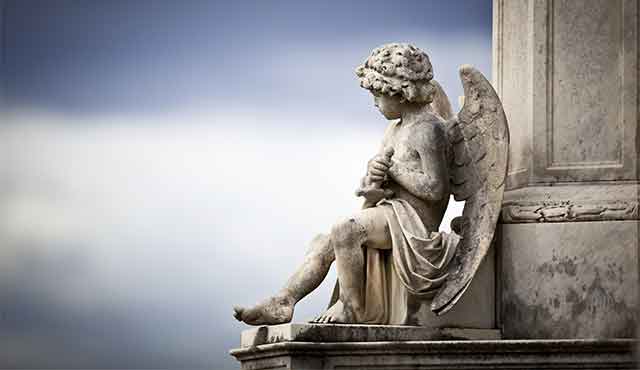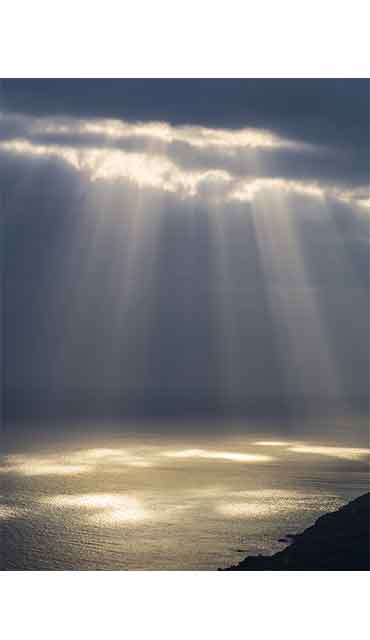Sister Barbra Ostheimer has a small, white statue in her office at the Loyola Institute for Spirituality (LIS) in the city of Orange. It depicts two figures, devoid of ornamentation almost to the point of abstraction, bowing reverently toward each other. “I’m here for you,” is the gold inscription on the base of the statue. The Hallmark-created keepsake is simple and unassuming, and yet somehow warm and reassuring. To Sister Barbra it’s symbolic of spiritual direction.
“A spiritual director meets personally with an individual who wishes to have accompaniment on their life journey, with the focus on a personal relationship with God,” Sister Barbra says. She is an instructor and associate director at LIS, and is both a spiritual director and a longtime directee.

So what is spiritual direction? It’s a one-on-one relationship between the director and directee created through monthly meetings (more frequent if needed and requested by the directee) where anything and everything is discussed, including the most worldly problems and crises the directee may be facing, all with the promise of complete confidentiality.
“Through gentle questioning and repeating something the directee says, the director often assists the directee to look more deeply at his or her own experience,” explains Sister Barbra.
The director may be a priest or a religious sister, but just as often is a member of the laity who has been called to study at one of many programs to become a director.
Of the many paths the faithful may take on the journey to become closer to God, spiritual direction is less well known than others. “Most Catholics don’t know there’s anything like spiritual direction out there,” says Father Robert Stephan, Program Director at the Loyola Institute of Spirituality. “It can be of great help to people to talk with someone, to help them reflect on what their experience of God can be.”
The role of the director isn’t to provide answers.
“We’re there to listen, to notice where God is in the midst of whatever is going on, whatever the problem may be,” says Ken Cachat, a spiritual director and board member at the Loyola Institute.
Orange County is home to several adult learning programs for those who aspire to become spiritual directors, including the Loyola Institute for Spirituality and The Art of Spiritual Direction, both in Orange, and the California Pro Sanctity Center in Fullerton.
—Sister Barbra Ostheimer
Joan Patten, Director of the Pro Sanctity Retreat Center in Fullerton, also emphasizes listening. “The spiritual director listens to that person’s relationship with God, the desires they share, and helps them root those desires and experiences back into God. But they also listen to what the Holy Spirit is saying, not just the person,” Patten says, calling spiritual direction “an extraordinary gift of the Holy Spirit.”
“Spiritual direction embraces the whole of your life, so it’s about anything in your life,” Sister Barbra says. “That’s what makes it so powerful. It’s about the wholeness of who you are becoming.
“I’m the best example of that,” says Shirley Espique. “Spiritual direction changed my life.” Ten years ago Espique, who was new to Catholicism, attended one session. “I was doubting my faith, but at that time I was not ready to listen or be guided,” she says.
It wasn’t until engaging in weekly spiritual direction as part of the Spiritual Formation Program at LIS that it really clicked for her. “I found things in my life I did not even know, “ Espique says. “I learned how to love myself, and by doing so I was free to give love and serve others. The God that I had ignored became my confidant, the one I trust.”
“I like the phrase ‘God has a dream for each one of us,’” says Cachat. “Spiritual direction allows that dream to unfold.”
All involved say every director/directee relationship and experience is different. And the details are meant to be strictly confidential, to the point that most directors won’t even reveal that a relationship with a directee exists.
The confidentiality is crucial. “It’s an opportunity for total openness,” says Sister Barbra. “Spiritual direction gives an opportunity to be transparent and be accepted. This is precisely what God does: accepts each individual as one is,” she says. So the spiritual director’s role is to convey “an acceptance of the directee that is as open as God’s acceptance of each human person.”
Those familiar with spiritual direction say one of its key attributes is helping the directee move beyond knowing intellectually that God loves them, into really feeling and experiencing that love in a deeply personal way.
“It’s God’s love that brings us together in that setting,” says Sister Barbra. “That is a deep belief in us as directors. Person-to-person, it’s the most God-like activity we can do.”


